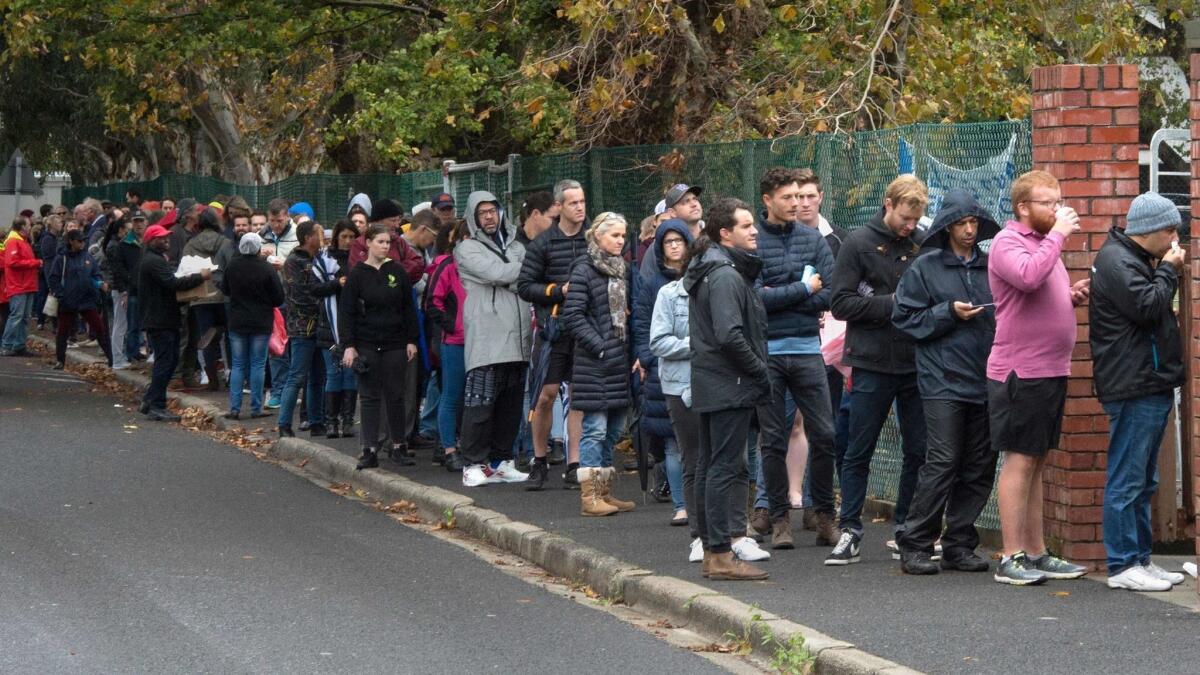South Africans vote in election that may challenge long-ruling African National Congress

- Share via
Reporting from SOWETO, South Africa — Winter arrived on election day in Johannesburg, and at one polling station in the city’s Soweto section, supporters of the ruling African National Congress tucked their green, yellow and black party flags into their woolly hats, waiting in the cold for President Cyril Ramaphosa to arrive.
Ramaphosa, who took over as head of state after scandal-prone Jacob Zuma stepped down last year, has been leading the charge ahead of Wednesday’s vote, a crucial test for Nelson Mandela’s party that has governed South Africa since its first free, multiracial elections in 1994.
Though the ANC is widely expected to hold on to its majority in the vote, the liberation party’s support has been declining.
Twenty-five years ago, millions of South Africans stood in line for hours to exercise their right to vote for the first time. Now many here believe the government has not done enough to dislodge the legacy of the system of racial segregation and subjugation imposed on black South Africans by a white-minority government for most of the 20th century.
A Pew survey released last week found 64% of South Africans were dissatisfied with their democracy. Zuma’s nine years in office were marred by a string of corruption allegations and a bruising economic slump. The unemployment rate now stands at 27% — and over 50% for people younger than 25 — and South Africa has been rated by the World Bank as the most unequal country in the world.
An ANC veteran and respected businessman, the 66-year-old Ramaphosa has brought a new sense of accountability to the party’s rhetoric, pledging to stamp out corruption, create jobs and get South Africa back on its once-promising growth path.
Longtime supporter Herbert Sithole, standing outside the Soweto polling station waiting to see the president cast his ballot, thinks he is up to the task.
“A new dawn has arrived,” said the 56-year-old, who, like many older ANC voters, supported the party throughout its long fight to end apartheid. “Ramaphosa is a man of integrity. I trust him.”
But many younger voters, including the “born free” generation, born into a democratic South Africa, don’t feel the same sense of allegiance to Mandela’s party and are turning to opposition parties who they think can do better.
The two largest, the Democratic Alliance and the Economic Freedom Fighters, have also been campaigning on promises to create more jobs and bring an end to corruption.
So far, neither has been able to mount a critical challenge to the ANC. The Democratic Alliance is hampered by the perception that it represents the interests of the white middle class, and the Economic Freedom Fighters’ fiery rhetoric and far-left policies, such as nationalizing South Africa’s land, banks and mines, alienate moderately minded voters.
But that dynamic is destined to shift in a country where nearly 30% of the population is younger than 15. Several recent polls show the Economic Freedom Fighters, a small party that has been savvy about reaching young voters, could double its vote share since the last national elections in 2014, from 6.4% to 12% or even 15%.
On Sunday, energized supporters of the Economic Freedom Fighters streamed into Orlando Stadium in Soweto, clad in the party’s trademark red jumpsuits, hard hats and custom dresses bearing the visage of its leader, Julius Malema.
Amanda Carmon, a 28-year-old chef in Johannesburg, said she used to support the ANC but switched her allegiance to the Economic Freedom Fighters five years ago.
The ruling party is looking after only its own political elite, Carmon said, but the Economic Freedom Fighters is looking out for the younger generation.
“We want to be as comfortable as everyone else,” she said.
Mahr is a special correspondent.
More to Read
Sign up for Essential California
The most important California stories and recommendations in your inbox every morning.
You may occasionally receive promotional content from the Los Angeles Times.










